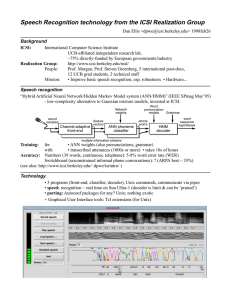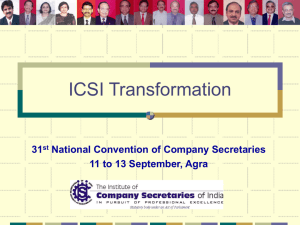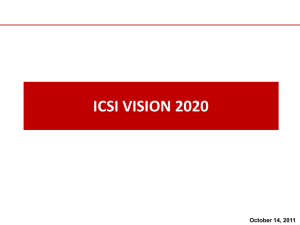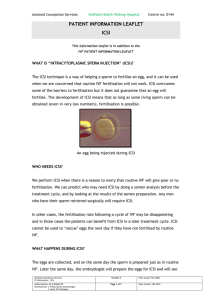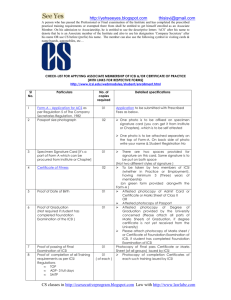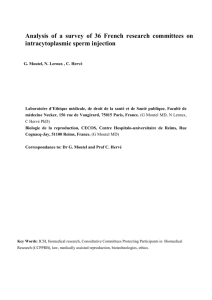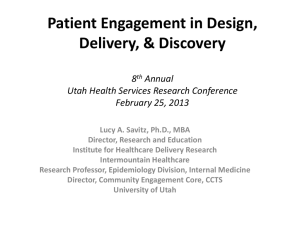Slides
advertisement
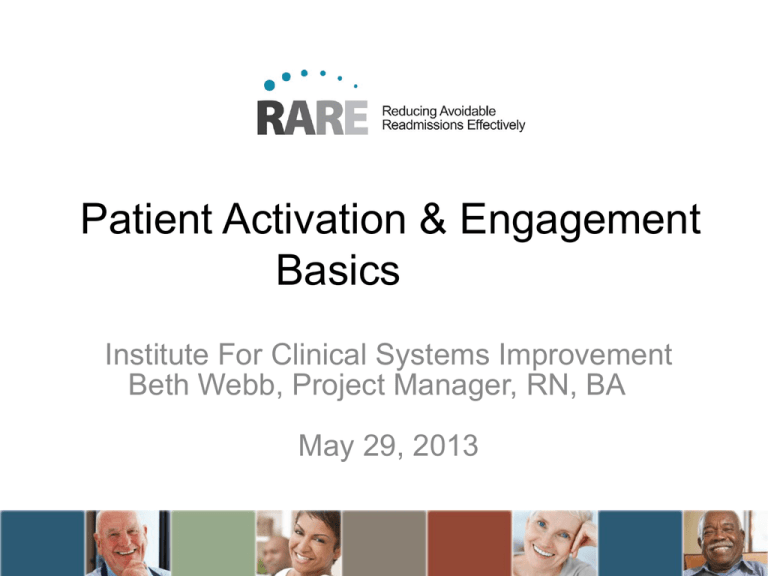
Patient Activation & Engagement Basics Institute For Clinical Systems Improvement Beth Webb, Project Manager, RN, BA May 29, 2013 Objectives • Identify the vital role that patients and families play in ensuring health and well-being as well as facilitating better health outcomes •Define the difference between patient activation & patient engagement •Identify three patient engagement strategies and tools © ICSI 2013 2 Patient and family centered care • A partnership among practitioners, patients, and their families (when appropriate) to ensure that decisions respect patients’ wants, needs, and preferences and that patients have the education and support they need to make decisions and participate in their own care © ICSI 2013 3 Patient-Centered Means…. • • • • Respect and dignity Information sharing Participation Collaboration ~Institute for Patient and Family Centered Care www.ipffc.org © ICSI 2013 4 Patient-Centered Means…. • Start where the patient is • Encourage realistic steps– creating opportunities to experience success • Build on strengths • Use measurement to assess and to track progress © ICSI 2013 5 Why be Patient-Centered? •Total cost of care for patients with patient centered care is 48.63% less than those without1 •Patient satisfaction can increase 3% or more when patient centered care is introduced2 •70% of one MN health plan’s insured is getting treatment from a provider under a TCOC agreement 1Bertakis, K, Azari, R, Patient Centered care is Associated with Decreased Health Care Utilization, JABFM 24(3):229-239 (2011) 2 Charmel, P, Frampton, S, Building the business case for patient-centered care, Healthcare Financial Management, March 2008 © ICSI 2013 6 Two Experts in the Room Provider’s Expertise1 Patient’s Expertise Diagnosis Experience of illness Disease Etiology Social circumstances Prognosis Attitude to risk Treatment options Values Outcome possibilities Preferences Coulter, A., Collins, A., Making Shared Decision-Making a Reality, The Kings Fund 2011 © ICSI 2013 7 Patient Activation • Patient activation—an “individual’s” knowledge, skill, and confidence for managing his/her own health and health care © ICSI 2013 8 Importance of Activation • If people don’t understand their role, they aren‘t going to take action, they aren’t going to look for or take in new information • If people don’t feel confident, they are less likely to be pro-active • This appears to be true regardless of condition © ICSI 2013 9 Value of Activation Research consistently finds that those who are more activated are: – Engaged in more preventive behaviors – Engaged in more healthy behaviors – Engaged in more disease specific selfmanagement behaviors – Engaged in more health information seeking behaviors © ICSI 2013 10 Value of Knowing Activation Level To know who needs more support To target the types of support and information patients and consumers need To evaluate efforts to increase activation To evaluate the quality of care To build the evidence base © ICSI 2013 11 Activation is developmental Source: J.Hibbard, University of Oregon © ICSI 2013 12 Levels of Participation • International Association of Public Participation © ICSI 2013 13 New Insights • Can identify “next steps” more appropriately • Presently asking too much of too many • When we focus on the more complex and difficult behaviors– we discourage the least activated • Start with patient’s values—minimize number of requests © ICSI 2013 14 Increasing Activation • Tailored coaching • Including brief coaching in the clinical setting– with follow-up • Segmentation approaches and differential allocation of resources • Care transitions and reducing hospital readmissions © ICSI 2013 15 Patient and family engagement • Patients, families, their representatives, and health professionals working in active partnership at various levels across the health care system—direct care, organizational design and governance, and policy making—to improve health and health care.1 1Health Aff February 2013 vol. 32 no. 2 223-231 © ICSI 2013 16 Tools for Partnering with Patients, families and caregivers • Understanding Behavior Change – Stages of Change (Prochaska) • • • • • Active Listening Coaching Motivational Interviewing Teach back Shared Decision Making © ICSI 2013 17 © ICSI 2013 18 Questions ? Upcoming RARE Events…. • Stay tuned for the next RARE Conversation in June 2013! Future webinars… • To suggest future topics for this series, Reducing Avoidable Readmissions Effectively “RARE” Networking Webinars, contact Kathy Cummings, kcummings@icsi.org
